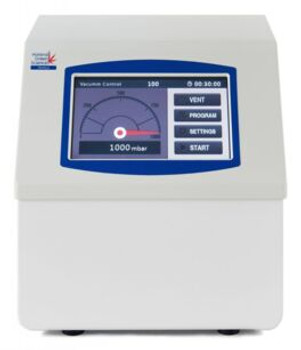Description
PAR-C VACUUM CONTROLLER – DUAL SENSOR (KF40)
The newest addition to Lab Society’s Precision Vacuum Monitor series is a true, wide-range vacuum controller (and vacuum gauge).
The controller includes two (2) points of vacuum measurement, and one has the ability to control an automatic isolation valve.
Precise Vacuum Control – “PARC” your system vacuum pressure.
The compound pressure sensor (single KF25 connection) readings are combined, utilizing proprietary software to create a single, blended, accurate reading that controls the automatic vacuum valve.
Having a compound pressure sensor that has measurement accuracy in the full 0.02 to 775 Torr range allows users to precisely control vacuum pressure within a system throughout the range of high-vacuum to atmospheric pressure.
Now you have the ability to set the vacuum control range via the LED/button interface to set the Upper Pressure Limit and Lower Pressure Limit.
The ideal placement for this compound probe is wherever pressure control is desired on a system – or closest to the action. The secondary thermocouple pressure sensor can be placed at the vacuum source (past cold trap at the pump) to determine ultimate vacuum pressure simultaneously while controlling/monitoring system pressure.
Features
- Compound pressure sensor for wide-range vacuum control
- Multiple units of vacuum measure
- Data logging via USB & EliteLab integration
- Digital vacuum gauge with visual display
- Portable
- Numerical output via LED screen, graphical via EliteLab software (requires a computer)
- Rod-mount support
- Easy and quick troubleshooting
- Rugged thermocouple probes for measurement
- Self-powered automatic vacuum valve
- Wide isolation valve orifice – to reduce bottlenecking of pressure before the valve
Applications
Benchtop Short Path Distillation
- Wide-range of accurate pressure control for various stages of the distillation process
- Pressure control for gently removing volatiles in the early stages of distillation
- Specific pressure control for more precise, repeatable distillations
- Reduce load on cold traps and vacuum pump due to high vacuum depth during volatile/solvent presence in the distillation process
- Operate systems in low-to-medium-to-high vacuum ranges
Thin Film Distillation
- Wide range of accurate pressure control for various stages of the distillation process
- Perform decarboxylation/devolatilization processes strategically in low-to-medium vacuum ranges (to prevent trap/pump overloading)
- Gently remove volatiles and/or terpenes from feedstock by raising system pressure
- Control feed rates by reducing pressure spikes and having static system pressure for consistent distillation
- Dual-purpose single-stage Thin Film Distillation units into decarboxylation/devolatilization units as well as high-vacuum distillation units
- Operate systems in low to medium to high vacuum ranges
The following sensors are included in the system:
- Compound pressure sensor consisting of two (2) sensor probes, connected via a single KF25 flange connection, that monitor vacuum pressure accurately in two (2) ranges:
- 0.02 to 2 Torr
- 2 to 775 Torr
- Thermocouple pressure sensor for accuracy in the 0.001 to 2 Torr and 6 to 800 Torr pressure ranges
PAR-C Specifications:
- Power: 100-240Vac 50/60Hz, 100 Watts
- Compound Sensor Interface:
- 531 Sensor & 775i Sensor mounted to single KF25 adapter
- AcRange: 20 mTorr to 775 Torr
- Thermocouple Sensor Interface:
- 531 Sensor with single KF25 connection
- Range: 1 mTorr – 760 Torr
- Isolation Valve Orifice: 0.5 inches
- Mount: Side-mounted rod support
- Indicator Lights
- Telemetry Options: USB
Note: For the LS-PAR-C, each sensor is labeled and calibrated to a particular probe input (slot) on the vacuum gauge display unit.





